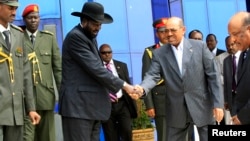KHARTOUM —
The leaders of long-time enemies Sudan and South Sudan pledged at a summit in Khartoum on Tuesday to end their conflicts and honor an agreement over vital cross-border oil exports.
South Sudanese President Salva Kiir flew to Khartoum for a day of talks with his Sudanese counterpart Omar Hassan al-Bashir in his only second visit since South Sudan's secession in 2011.
Diplomats hoped the meeting would defuse recent tensions and help build trust between the neighbors, who fought one of Africa's longest civil wars until 2005.
The two agreed in March to resume oil exports from landlocked South Sudan through the north, its only route to market. Juba had stopped oil flows for 16 months when a conflict over disputed territory and pipeline fees flared last year.
But Sudan has threatened to again stop oil shipments by Friday unless Juba cuts ties with rebels operating across the almost 2,000-km (1,300-mile)-long border. South Sudan denies supporting the insurgents.
At the start of their meeting Bashir and Kiir said they were committed to all bilateral cooperation agreements including oil, without mentioning the crude stoppage threat.
“We are committed to implement the agreements signed by the two countries,” Bashir told the start of the joint session open to the media. “We want to leave the problems of the past behind us and open a new page for the benefit of the two people,” he said, adding that any rebel support would have to stop.
Kiir also said he wanted a new chapter in bilateral ties and open the joint border for trade, a move agreed in September but not implemented by Sudan due to Juba's alleged rebel support.
“You closed the border. We didn't do that but we're ready to reopen it within 24 hours,” Kiir said, adding that Juba did not support any Sudanese insurgents.
South Sudan relies heavily on oil exports to fund its budget and any shutdown could have serious economic and political implications.
Diplomats doubt Sudan will seal off the two cross-border pipelines as it needs South Sudan's transit fees to stabilize its economy reeling from the loss of most oil reserves with southern secession. Khartoum has several times extended a deadline threatening a halt of oil flows.
Apart from rebel support, the neighbors are also at loggerheads over disputed frontier areas such as Abyei, which is highly symbolic to both countries.
South Sudanese President Salva Kiir flew to Khartoum for a day of talks with his Sudanese counterpart Omar Hassan al-Bashir in his only second visit since South Sudan's secession in 2011.
Diplomats hoped the meeting would defuse recent tensions and help build trust between the neighbors, who fought one of Africa's longest civil wars until 2005.
The two agreed in March to resume oil exports from landlocked South Sudan through the north, its only route to market. Juba had stopped oil flows for 16 months when a conflict over disputed territory and pipeline fees flared last year.
But Sudan has threatened to again stop oil shipments by Friday unless Juba cuts ties with rebels operating across the almost 2,000-km (1,300-mile)-long border. South Sudan denies supporting the insurgents.
At the start of their meeting Bashir and Kiir said they were committed to all bilateral cooperation agreements including oil, without mentioning the crude stoppage threat.
“We are committed to implement the agreements signed by the two countries,” Bashir told the start of the joint session open to the media. “We want to leave the problems of the past behind us and open a new page for the benefit of the two people,” he said, adding that any rebel support would have to stop.
Kiir also said he wanted a new chapter in bilateral ties and open the joint border for trade, a move agreed in September but not implemented by Sudan due to Juba's alleged rebel support.
“You closed the border. We didn't do that but we're ready to reopen it within 24 hours,” Kiir said, adding that Juba did not support any Sudanese insurgents.
South Sudan relies heavily on oil exports to fund its budget and any shutdown could have serious economic and political implications.
Diplomats doubt Sudan will seal off the two cross-border pipelines as it needs South Sudan's transit fees to stabilize its economy reeling from the loss of most oil reserves with southern secession. Khartoum has several times extended a deadline threatening a halt of oil flows.
Apart from rebel support, the neighbors are also at loggerheads over disputed frontier areas such as Abyei, which is highly symbolic to both countries.





